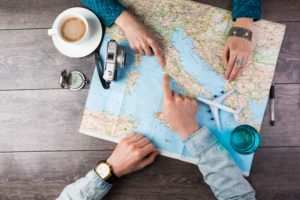The Return of Anticipation
- Featured
- White Papers
Since the start of the pandemic in March of 2020, we all have gone through a lot. Whether it was missing a family reunion, an anniversary cruise, a vacation with best friends, or simply a special dinner out. What all these things have in common is the one thing we didn’t know we were going to miss: anticipation.
From the American Psychological Association: Anticipation is a state of expectation or excitement about an upcoming event or situation. It is a state of suspense and expectancy. For example, when you know an old friend is going to drop by you probably are in a state of anticipation while waiting for them–you are excited, maybe a little nervous, and filled with expectations about their visit.
Before the pandemic, our lives were full of anticipation. Upcoming movie releases, lunch with a colleague, a trip to the museum, a dinner with a loved one, a pending concert. These things all slowly (and quickly!) ended. Restaurants closed so reservations were canceled. Concerts that were months away became unceremonious credit card refunds. Family vacations turned into airline vouchers and cancellation emails from hotels and rental car companies.

But we need anticipation. The very nature of that feeling is all about future reward, and right now, almost more than many other things, we deserve a reward. From lunch to travel, anticipation is the bringer of excitement, the harbinger of adventure, or simply the feeling that we are going to be doing something unmapped, uncharted, and different. Anticipation often includes daydreaming, research, and planning.
The Doblin Group, an innovation consultancy based in Chicago, codified compelling experiences. Their research showed that one of the key attributes to any compelling experience is the first of three phases, attraction. “Attraction” referred to the build-up to the experience itself, notably research, planning, and daydreaming. In other words, anticipation.
Kelsey Borresen, a Senior Reporter with Huffpost wrote a piece last year called, “The Psychological Benefits of Having Something to Look Forward To.” In it, she wrote:
Research suggests that living in the present moment and practicing mindfulness can increase happiness.
“However, during particularly stressful moments in time, like our current pandemic, it can be more beneficial to have something to look forward to,” said Atlanta therapist LeNaya Smith Crawford.
Anticipation, in many ways, is hope for the future. That state of suspense and expectancy is now its own ecstasy, an ecstasy we are can control. “It is the implicit knowing that positive emotion will happen in the future,” says Guy Kuchnick, a New York psychologist and founder of Techhealthiest. According to research published in the journal Psychological Science, planning your itinerary, booking tickets, and anticipating a vacation can boost your mood long before you step on a plane.
We’ve been stressed. We need anticipation.
Theme parks are open or are opening up. Vaccines are moving through their phases and the CDC’s guidelines for gathering are loosening as a result. Local jurisdictions are allowing, in many cities, for restaurants to open indoor dining again.
All these things bring hope because they are the impetus of anticipation.
Airlines and cruise lines have better, more flexible cancellation policies now than in the past. Maybe not tomorrow, but soon, we can journey again. Why not enter that “Attraction” phase of any compelling experience and start researching your next vacation, plan that cruise, start organizing the next family reunion, or simply consider where the first place will be when you go out to dinner again?
Let’s bring back anticipation.
Related Posts
Access for All
- White Papers
The wheelchair access queue line, the closed-captioning on a ride...
Thinkwell, Transformed
- Blog Posts
As we start to come out the other side of...
Lessons From Lockdown
- Blog Posts
As designers and developers of location-based experiences, we have the...